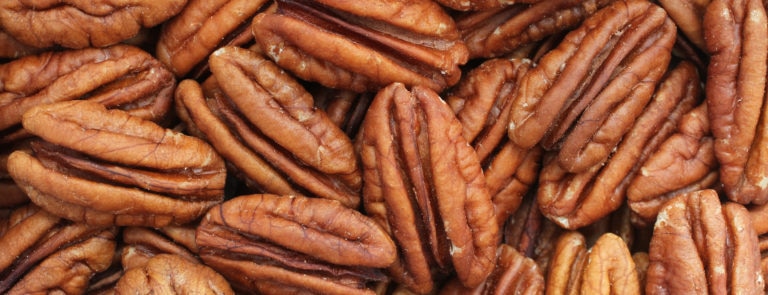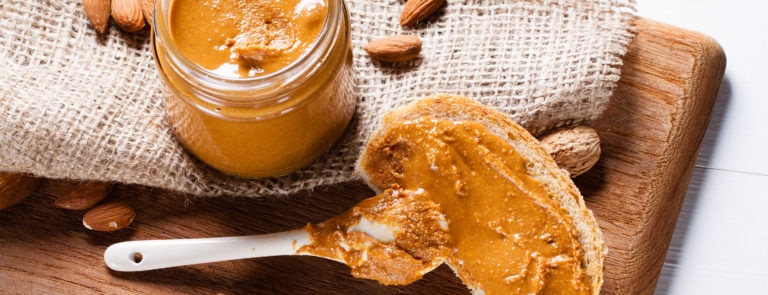10% off £35
The health benefits of pecans

Native to America, pecans are part of the walnut family and go perfectly with all sorts of dishes.
Their unique appearance, buttery flavour and crunchy texture means they make a great side dish, and they look great as a table centrepiece too. But just how good are they for you? The good news – they happen to be pretty healthy.
Here, we explore the different health benefits of eating pecans, taking a deeper look into their nutritional profile and some ways to add more of them to your diet. Bon appetite!
What are pecans?
Pecans are a nut that hail from North America, although Mexico is currently the largest pecan producer in the world, closely followed by the US.1
You can eat them fresh or you can roast them, as well as cook (you can use them in salads and main meals) and bake with them (you can use them in bread, muffins, ice cream and other desserts).
When you think of pecans, most people think of pecan pie, which is a classic American sweet treat that’s crammed full of pecans.
It’s easy to get pecans mixed up with walnuts because the two don’t look too dissimilar to one another.
But you should know which one’s which when you taste them because pecans taste sweeter than pecans and walnuts have a slightly bitter edge to them.
Pecans tend to be that bit more delicate compared to walnuts too and their shells are smoother and straighter.
Pecan nuts shells are a lot easier to crack than walnut shells too. If you run out of pecans, then walnuts are your best substitute, as well as almonds or pistachio nuts.
Summary
Pecans are a nut that originate from North America and have a delicious buttery, slightly sweet taste and a crunchy texture. They’re not the same as walnuts.
Are pecans good for you?
Don’t underestimate the power of the humble pecan because raw pecans happen to contain zero cholesterol and sodium. What’s more, they’re low in carbohydrates.
Oh, and they have a rich buttery taste, that makes them a tasty and healthy snack compared to other snacks out there. As with all snacks, it’s best you don’t go overboard with munching away on them; moderation is key.
Nutrients in pecans
Here are just some of the nutrients found in pecans (nutrient levels will vary depending on the pecan and overall portion size): 2
- Protein: an important building block of bones, muscles, cartilage, skin and blood, protein is used by the body to build and maintain tissues.3 A one ounce serving of pecans provides 2.6g of protein. 4
- Vitamin A: supports bone and eye health and promotes healthy growth and reproduction. It also helps protect your eyes from night blindness and age-related decline.5
- Vitamin E: may help reduce damage from oxgen free radicals.6
- Fibre: helps normalise bowel movements and promotes good digestive health.7
- Folic acid: helps the body produce and maintain new cells. It can also help prevent any DNA changes.8
- Calcium: needed by the body to support overall bone health. Also, the heart, muscles and nerves all need calcium to function properly.9
- Carbohydrates: pecans contain carbs, but aren’t too carb-heavy. One ounce of pecan halves contains just 4g of carbohydrates, most of which comes from fibre.10
- ‘Good’ fats: pecans contain 20g per ounce of fat; most of which comes from heart-healthy monounsaturated and polyunsaturated fatty acids. A one ounce serving of pecans contains less than 2g of ‘bad’ saturated fat.11
- Manganese: pecans contain more than half of the daily value you need for manganese. This mineral helps with bone development and carbohydrate metabolism.12
Summary
Pecan are packed full of so many different vitamins and minerals, ranging from Vitamins A and E, to protein, manganese, fibre, ‘good’ fats and folic acid.
Health benefits of pecans
-
They’re good for your heart
Due to their high levels of oleic acid and antioxidants, pecans are great for heart health. According to the National Pecan Sellers Association, regularly eating pecan nuts helps decrease bad cholesterol and increase good cholesterol, which can help prevent strokes and coronary artery disease.13
-
They can help with weight loss
Due to their high calorie content, eating nuts can help you feel fuller for longer, thus minimising the temptation to snack on ‘bad fats’.
There have been several studies that show regularly eating nuts, including pecans, isn’t linked to weight gain. One study found that people who regularly eat nuts had a 31% lower risk of weight gain than those who rarely ate them.14
-
They can potentially help you keep the weight off too
A review of pecans published in the American Journal of Clinical Nutrition in 2003 suggested that nuts, such as pecans, may aid with weight loss and weight loss maintenance.
This is due to their ability to keep you feeling fuller for longer (as mentioned above), making you less likely to snack on other food.
Because of their tasty flavour and texture, it’s also believed people are more likely to stick to snacking on them too. 15
-
They have anti-inflammatory benefits
Rich in magnesium, pecans are known for their anti-inflammatory benefits.
Increased magnesium intake reduces chronic inflammation in the body which, in turn, reduces the inflammation of arterial walls, reducing the risk of chronic diseases like arthritis, Alzheimer’s disease and cardiovascular disease. 16
-
They can support brain health
As you’ll know from above, pecans contain Vitamin E, which has been linked to reducing the risk of developing Alzheimer's disease and dementia by up to 25%.
It’s down to the way Vitamin E’s antioxidants properties help lower oxidative stress that’s created by inflammation, protecting cells and vital organs, such as our brain, in the process.17
-
They’re great for cutting out salt from your diet
Consuming too much sodium can lead to health issues, such as high blood pressure. Pecans don’t contain any sodium (salt), which is ideal if you’re looking to reduce your salt intake.
So, if you love nuts, but are watching your salt levels, then pecans are the perfect option – you don’t have to do anything to them either, just enjoy them as they come.18
-
They may help improve blood sugar levels
First up, pecans happen to naturally contain very little sugar.
Secondly, they’re believed to also potentially help improve blood sugar levels by slowing down the rate of absorption from the bloodstream into peripheral tissues.
The end result: balanced energy levels and fewer blood sugar spikes.19
-
They can make you regular
It’s all down to the fibre that’s naturally found in pecans that enables them to help promote good digestive health. Fibre helps regulate our bowel movements and, in doing so, eliminates any toxins from our bodies.20
It’s thought that eating a ¼ of a cup of pecans a day, which is the equivalent to 3g, can contribute to your daily fibre allowance of 25 to 35g a day.
-
They may be suitable for those with diabetes
Pecans have been proven to be beneficial for blood sugar control due to the fact their healthy fat content and low carbohydrate levels prevent blood sugar spikes.21
What’s more, their fibre content helps stabilise blood sugar.
Research has found that increasing the consumption of tree nuts, such as pecans, without increasing calories can reduce haemoglobin A1c levels and fasting glucose, two key factors for effective diabetes management.
Other health benefits of pecans
- They may help with prostate health – eating two ounces of pecans a day has been shown to have a positive effect on managing and preventing enlarged prostates.22
- They’re packed full of so many vitamins and minerals – 19 of them to be precise. How many other foods can you say that about?23
- They can reduce the symptoms of PMS – the manganese in pecans can help ease the effects of mood swings and cramps when taken with calcium during PMS.24
- They can support hair health – pecans contain L-arginine, an amino acid that can encourage the growth of healthy hair by promoting blood flow to the head.25
Summary
Lots of health benefits have been linked to pecans due to the fact they contain an abundance of vitamins and minerals. They can help with weight loss, heart health, inflammation, plus so much more.
Are pecans the healthiest nut?
As you’re most probably aware by now, pecans have got a lot to offer. But how do they stack up compared to other nuts?
| Nut | Protein | Fibre | Fat | Iron | Calcium | Potassium | Vitamin E | Magnesium | Key nutrients |
|---|---|---|---|---|---|---|---|---|---|
| Pecans | 4.7g | 5g | 36g | 1.25mg | 35mg | 205mg | 0.7mg | 61mg |
Fibre |
| Almonds | 11g | 6g | 24g | 1.9mg | 123mg | 353mg | 12mg | 134mg |
Magnesium |
| Peanuts | 12.5g | 4g | 24g | 2.3mg | 46mg | 354mg | 4mg | 84mg | Iron Protein Potassium |
| Walnuts | 7.5g | 3.5g | 32.5g | 1.5mg | 49mg | 220mg | 11mg | 79mg | Omega 3 Vitamin E |
| Cashews | 9g | 1.5g | 22g | 3.5mg | 28.5mg | 330mg | 2.5mg | 146mg | Iron Magnesium |
| Brazil nuts | 7.1g | 3.2g | 33g | 1.2mg | 80mg | 329mg | 2.6mg | 188mg | Selenium Potassium Magnesium |
Who shouldn’t eat pecans?
It almost goes without saying that if you have any type of nut allergy, you should avoid eating pecans, as you may develop side effects, including a rash, swelling, itchy skin, digestive issues, and even, swelling of the tongue and throat.26
Interestingly, in the US, tree nut allergy is one of the eight most common food allergies, affecting roughly 0.5 to 1% of the population 27
Tree nuts include almonds, Brazil nuts, cashews, hazelnuts, pecans, pistachios and walnuts. If you’re allergic to one tree nut, you may not necessarily be allergic to them all.
However, it’s essential you err on the side of caution, as the side effects can be life-threatening in some instances.
It’s best, and safer, that you avoid eating nuts altogether and eat seeds, such as sesame, sunflower and pumpkin, or legumes instead.
How many pecans should I eat a day?
The recommended serving size for one person is 15 pecans.
Summary
Around 15 pecans a day is a healthy daily measure. If you have a nut allergy, particularly a tree nut allergy, it’s best you eat legumes and seeds instead.
How to add more pecans into your diet
Pecans can be enjoyed in so many different ways; you can have them for breakfast, lunch and, of course, as a snack.
Breakfast
Pecans are a great breakfast ingredient because they help fill you up and avoid you snacking until lunchtime.
Pecan breakfast recipe idea: Vegan Dark Chocolate & Pecan Granola.
Lunch/dinner
Wholesome and hearty, pecans go great in all sorts of dishes, from pies to casseroles, nut roasts and salads.
Pecan lunch/dinner recipe idea: Vegan Walnut, Cashew & Peanut Roast (remember how we said walnuts and pecans are very similar? Try switching the walnuts with pecans in this recipe for a less bitter and slightly sweeter end result).
Snacks
Because they’re naturally sweet (and filling) pecans are the perfect choice for satisfying your sweet tooth and eating in moderation.
Pecan snack recipe idea: Vegan No Bake Brownies
Takeaway
Pecans are an absolute powerhouse of an ingredient and raw snack. Not only can they be used in most meals, you can enjoy them as they come and snack away on them whenever you feel peckish.
They contain a whopping 19 vitamins and minerals and the health benefits of pecan nuts are just as long, if not longer.
If you’ve not really eaten pecans, give them a go, with the help of the recipes listed above, it’s remarkable how so much goodness can be attributed to just one little nut.
For more nut insight, check out this article, ‘The benefits of Brazil nuts.’
Last updated: 15 June 2021
- https://www.thespruceeats.com/what-are-pecans-1328633
- https://ilovepecans.org/nutrition-in-a-nutshell/
- https://www.webmd.com/men/features/benefits-protein#1
- https://www.verywellfit.com/pecan-nutrition-facts-calories-and-health-benefits-4114348#pecan-nutrition-facts
- https://www.medicalnewstoday.com/articles/318168
- https://www.mayoclinic.org/healthy-lifestyle/nutrition-and-healthy-eating/in-depth/fiber/art-20043983
- https://www.drugs.com/folic_acid.html
- https://www.mayoclinic.org/healthy-lifestyle/nutrition-and-healthy-eating/in-depth/calcium-supplements/art-20047097
- https://food.ndtv.com/food-drinks/why-pecan-nuts-are-good-for-you-and-how-to-eat-them-1262183
- https://www.verywellfit.com/pecan-nutrition-facts-calories-and-health-benefits-4114348#pecan-nutrition-facts
- https://www.verywellfit.com/pecan-nutrition-facts-calories-and-health-benefits-4114348#pecan-nutrition-facts
- https://www.thehealthy.com/nutrition/pecan-nutrition-benefits/
- https://pubmed.ncbi.nlm.nih.gov/17228038/
- https://www.goodhousekeeping.com/health/diet-nutrition/a47166/health-benefits-of-pecans/
- https://ilovepecans.org/nutrition-in-a-nutshell/
- https://www.goodhousekeeping.com/health/diet-nutrition/a47166/health-benefits-of-pecans/
- https://www.goodhousekeeping.com/health/diet-nutrition/a47166/health-benefits-of-pecans/
- https://www.goodhousekeeping.com/health/diet-nutrition/a47166/health-benefits-of-pecans/
- https://www.goodhousekeeping.com/health/diet-nutrition/a47166/health-benefits-of-pecans/
- https://www.verywellfit.com/pecan-nutrition-facts-calories-and-health-benefits-4114348#pecan-nutrition-facts
- https://www.verywellfit.com/pecan-nutrition-facts-calories-and-health-benefits-4114348#pecan-nutrition-facts
- https://www.mashed.com/74664/nuts-you-should-shouldnt-eating/
- https://www.wideopeneats.com/health-benefits-pecans/
- https://www.wideopeneats.com/health-benefits-pecans/
- https://www.wideopeneats.com/health-benefits-pecans/
- https://www.betterhealth.vic.gov.au/health/ConditionsAndTreatments/nut-allergies
- https://www.aaaai.org/conditions-and-treatments/library/allergy-library/tree-nut-allergy














